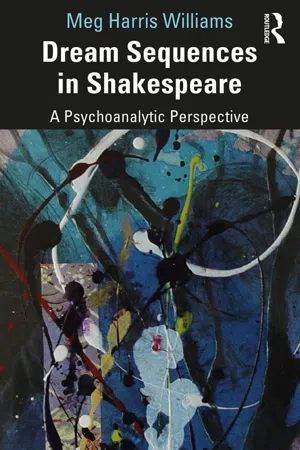
- 174 pages
- English
- ePUB (mobile friendly)
- Available on iOS & Android
About this book
This book takes a new approach to Shakespeare's plays, exploring them as dream-thought in the modern psychoanalytic sense of unconscious thinking.
Through his commitment to poetic language, Shakespeare offers images and dramatic sequences that illustrate fundamental developmental conflicts, the solutions for which are not preconceived but evolve through the process of dramatisation. In this volume, Meg Harris Williams explores the fundamental distinction between the surface meanings of plot or argument and the deep grammar of dreamlife, applied not only to those plays known as 'dream-plays' but also to critical sequences throughout Shakespeare's oeuvre.
Through a post-Kleinian model based on the thinking of Bion, Meltzer, and Money-Kyrle, this book sheds new light on both Shakespeare's own relation to the play and on the identificatory processes of the playwright, reader, or audience. Dream Sequences in Shakespeare is important reading for psychoanalysts, playwrights, and students.
Trusted by 375,005 students
Access to over 1 million titles for a fair monthly price.
Study more efficiently using our study tools.
Information
Chapter 1
The individual and the group: Richard II and Julius Caesar
Richard II: a dream of deposition *
The mother-land
Speechless death
Table of contents
- Cover
- Half Title
- Title Page
- Copyright Page
- Contents
- Acknowledgements
- Preface
- 1 The individual and the group: Richard II and Julius Caesar
- 2 The reason of love objects: A Midsummer Night’s Dream
- 3 Dreamlife and adolescent identity in Hamlet and Ophelia
- 4 Dreams of dark corners: legalism at play in The Merchant of Venice and Troilus and Cressida
- 5 Explorations in minus K: Macbeth and Othello
- 6 The turbulence of aesthetic conflict: King Lear
- 7 Love and the evolution of thought: Antony and Cleopatra
- 8 The organ of consciousness in Cymbeline
- 9 A dream of reparation: The Winter’s Tale
- 10 The birth of ideas: The Tempest
- Epilogue
- Appendix: Dream-life in the post-Kleinian model of the mind
- References and bibliography
- Name index
- Subject index
Frequently asked questions
- Essential is ideal for learners and professionals who enjoy exploring a wide range of subjects. Access the Essential Library with 800,000+ trusted titles and best-sellers across business, personal growth, and the humanities. Includes unlimited reading time and Standard Read Aloud voice.
- Complete: Perfect for advanced learners and researchers needing full, unrestricted access. Unlock 1.4M+ books across hundreds of subjects, including academic and specialized titles. The Complete Plan also includes advanced features like Premium Read Aloud and Research Assistant.
Please note we cannot support devices running on iOS 13 and Android 7 or earlier. Learn more about using the app